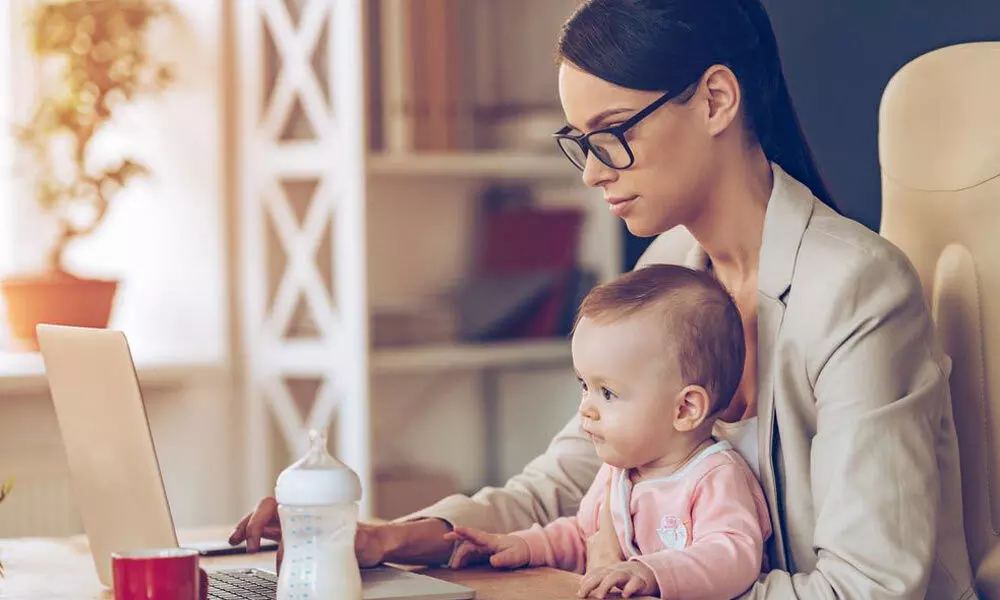Live
- Samajwadi Party slams UP govt over Sambhal violence, calls it orchestrated
- BGT 2024-25: Very proud of the way we came back after being put under pressure, says Bumrah
- CBI gets evidence about circulation of expired medicines on RG Kar campus
- Now complaint filed with Governor against Karnataka Minister M.B. Patil
- Ragging Scandal at Khammam Medical College: Professor Faces Action for Shaving Student’s Head
- More Waqf notices issued during BJP's tenure: Karnataka HM on statewide stir plans
- More Waqf notices issued during BJP's tenure: K'taka HM on statewide stir plans
- Rohit Sharma Spotted with Team as India Wins First Test of Border-Gavaskar Trophy
- Post-poll violence breaks out in Jharkhand after announcement of results
- Abhishek Bachchan's Marriage Rumors, Vivek Oberoi's Luxury Car, and BLACKPINK's Solo Success – Here's What's Trending!
Just In
How much does raising a child impact your career?


How much does raising a child impact your career?
When it comes to raising children, men and women have different perspectives on the division of household labour—from cooking meals to offering emotional support—reveals a new poll from the Associated Press-NORC Center for Public Affairs Research and the Harris School of Public Policy at the University of Chicago.
When it comes to raising children, men and women have different perspectives on the division of household labour—from cooking meals to offering emotional support—reveals a new poll from the Associated Press-NORC Center for Public Affairs Research and the Harris School of Public Policy at the University of Chicago.
The new study also reveals important differences in how men and women perceive the impact of having a child on job security and workplace success. Mothers are more likely to say they perform more of the household responsibilities, while fathers are more likely to say they share the responsibilities equally with their partners.
Yana Gallen, Asst. Prof. says, "In fact, 35 percent of mothers reported doing more than their partner for each of the eight household responsibilities asked about on the survey, compared to just 3 percent of fathers who reported the same."
"Although the gap between what mothers and fathers report is significant, it is not what either anticipates before they have children—and that's what is so interesting," said Yana at the Harris School of Public Policy who studies the gender pay gap. "Prior to becoming parents, most men and women expect that they will share the division of labour equally across all household activities, but their views on whether that is actually the case diverge after they have a child."
The perceived impacts of having a child are also relevant to the workplace, where half of the adults who have been employed say having a child is an obstacle to employee advancement, and about 4 in 10 say the same regarding job security and the opportunity for a raise.
Americans' perspectives on children in the workplace are tied to gender as well, with 47 percent of women saying that having a child is an obstacle for job security compared to 36 percent of men. Similarly, adults making less than $50,000 a year are more likely than higher-income adults to say having a child is an obstacle for job security (50 percent vs 35 percent ) and job advancement (55 percent vs 46 percent ). "Women and lower-income Americans are especially likely to feel they are paying a penalty at work for becoming a parent," said David Sterrett, a senior research scientist with the AP-NORC Center. "Whether it comes in the form of limited job choices because of the need for a schedule that accommodates parenting or having less job security, these groups feel they are missing out on career opportunities compared to their co-workers without children." The poll also finds that in order to manage their work and personal lives, two-thirds of adults have chosen a job with a schedule that allows them to manage their other responsibilities and 68% get support from friends or family.
And when thinking about whether to have a child, more than 8 in 10 Americans say having a stable partner and having a secure job are important factors that they consider. "Prior to becoming parents, most men and women expect that they will share the division of labour equally across all household activities."
Among the key findings from the report:
• Forty-three per cent of adults without a college degree say having a child is an obstacle to getting a raise, while 32 percent of adults with a college degree say the same.
• Parents are more likely than non-parents to have chosen a job with a schedule such that they can manage their personal responsibilities, spent less time at their job to focus on friends or family, and to have made sure they had the support of friends or family.
• Women are more likely than men to have chosen a job with a schedule such that they can manage their personal responsibilities (70 percent vs 61percent ) and made sure they had the support of friends or family (73 percent vs 64 percent ).
• Nearly three-quarters of Americans without children (74 percent ) say having enough savings is an important factor when thinking about their decision whether or not to have children, compared to 59 percent of parents who said it was important.
• Women are more likely than men to say flexibility at work is important when thinking about whether or not to have a child (74% vs 66%).
This study was conducted by the University of Chicago Harris School of Public Policy and the Associated Press-NORC Center for Public Affairs Research with funding from NORC at the University of Chicago.

© 2024 Hyderabad Media House Limited/The Hans India. All rights reserved. Powered by hocalwire.com






